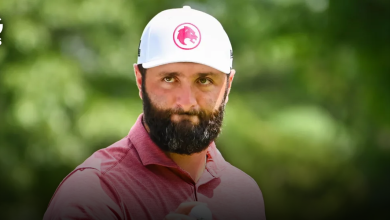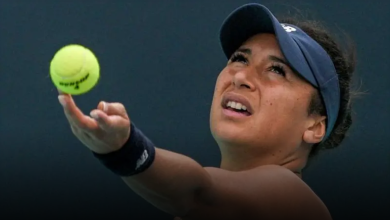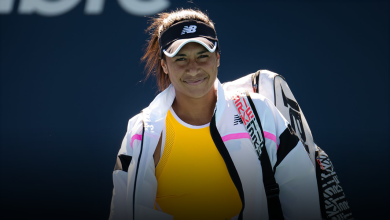Coco Gauff’s Riyadh run crystallized her status as an American role model

Steadily – and rapidly – over the last 30 years, seeking to both expand their economic strength by not relying solely on their petroleum riches as well as struggling to convince the world they are becoming a less repressive regime, the Kingdom of Saudi Arabia has built an empire across the broad spectrum of professional sports; F1 racing, soccer, basketball, WWE and, most notoriously, golf with the LIV tour. And now professional tennis is the latest sport to be seduced by the massive amounts of money that the Kingdom can offer, with the WTA Finals just having concluded in Riyadh.
In 2023, while the Kingdom was intensely lobbying the WTA to host the tennis tour’s year end finals in Riyadh, a fault line developed amongst the old guard of the sport, with Chris Evert and Martina Navratilova on one side and Billie Jean King on the other. In late 2023, just before the WTA confirmed that Riyadh would indeed host the 2024 WTA Finals, Evert and Navratilova sent a letter to the WTA outlining their deeply felt concerns:
In light of the WTA Finals potentially being moved to Saudi Arabia, we feel it is essential to speak up now and highlight why we are so concerned. The WTA Finals is the crown jewel of our tour and we can’t sit back and allow something as significant as this to happen without an open, honest and transparent discussion.We fully appreciate the importance of respecting diverse cultures and religions. It is because of this, and not in spite of it, that we believe allowing Saudi Arabia to host the WTA Finals is entirely incompatible with the spirit and purpose of women’s tennis, and the WTA itself.
The WTA was founded on fairness and equality to empower women in a male dominated world. In short, the WTA should represent values which sit in stark contrast to those of the Kingdom of Saudi Arabia. Not only is this a country where women are not seen as equal, it is a country which criminalizes the LGBTQ community.
A country whose long term record on human rights and basic freedoms has been a matter of international concern for decades. Taking the WTA Finals to Saudi Arabia would represent taking a significant step backwards, to the detriment of the WTA, women’s sports and women. We ask the WTA to give thought to all these considerations.
Nearly a year after writing the letter, Navratilova didn’t change her mind. “We lost our moral high ground when the women decided to go there,” Navratilova was quoted in the New York Times in October. “You have to show me some progress first. Women have to be equal citizens under the law. Otherwise, we might as well play in North Korea.”For her part, in the lead-up to the WTA’s decision, King took the position that dialogue and involvement were the only ways to initiate action and progress, saying in an interview with the National, “How are we going to change things if we don’t engage? It’s hard, it’s very hard. So when we go to a country and play a tournament, just think, if you’re a little girl, or a parent, that they get to see these women being very successful and great athletes, and it helps change the hearts and minds of people and how they think.”
Of course, no one can cast aspersions on King’s bona fides when it comes to her storied involvement with social activism (with perhaps the one blemish being her sitting on the board of Phillip Morris for several years, as payback for Virgina Slims sponsoring the women’s tour). Her stance vis-à-vis Saudi Arabia is somewhat similar to that of Arthur Ashe when he went to South Africa 50 years ago. Back in 1973, Ashe decided – much to the dismay of many black activists here in the United States – to travel to Johannesburg and play in the South African Open, even though black spectators would have to sit in a separate area, far from the court. From Ashe’s perspective, having young black kids see a free black man competing at the highest level of a very white sport would give hope to those living in an apartheid state.
However one feels about the WTA engaging with the Kingdom, the issue has highlighted an undeniable aspect of women’s tennis: the continuing, decades-long commitment by players – usually American – in highlighting critical issues, especially as it pertains to human rights. From Ashe and Billie Jean to Martina to the Williams sisters, these American athletes have shown a willingness to express a social consciousness, be it by word or deed. For a sport long – and wrongfully – considered “elite”, tennis has been at the forefront of social change, perhaps more than any other sport.
Continuing this tradition of American women players expressing themselves on the global stage is Coco Gauff. The American superstar, and 2023 US Open champion, is still only 20 years old but she has displayed a wisdom and thoughtfulness that belie her youth. And this was especially evident during her brilliant run to the title at the WTA Finals in Riyadh last week.
Gauff’s mixed feelings about playing in Saudi Arabia proved that there was an effective middle ground to take, as she effectively threaded the needle in navigating how best to handle the situation.

“Obviously I’m a woman. I was very concerned. My dad was very concerned with me coming here,” Gauff said before the tournament. “‘I would be lying to you if I said I had no reservations. Obviously, you know who I am and the things I speak about. I was pretty much on every player call I could make with WTA. One of the things I said, if we come here, we can’t just come here and play our tournament and leave. Like, we have to have a real program or real plan in place.”
And, true to her word, Gauff did make sure to communicate directly with women in Saudi Arabia. “We spoke with a lot of women here in Saudi. One of them was Princess Reema. Multiple calls with her, how the best approach would be to enter into this different place that women have never kind of, women from the US, have never kind of been in. I think for me it was important, and it was one of the questions I brought up because about LGBTQ issues, women’s rights issues, how we can help with that.”
Finally, Gauff brought it full circle, incorporating her own family history of facing prejudice, Gauff stated said, “I think knowing from the past from my grandmother, integrating her school, people aren’t going to like it, but obviously in the long run I think it could be better for everybody,’ Gauff said.
Most tellingly, Gauff told reporters that her decision to play Riyadh in the future (the city is under contract to host the Finals again in 2025 and 2026) is not unconditional, saying, “If I felt uncomfortable or it felt like nothing’s happening, then … I probably wouldn’t come back.”
Oh yes, lest we forget the reason why Gauff was in Riyadh, she also managed to win the year-end tour title, defeating the world’s top two players (Iga Swiatek and Aryna Sabalenka) in straight sets along the way, and coming back in the Finals against Qinwen Zheng to secure the championship and take home the highest-ever payday in women’s tennis.
This concludes an utterly torrid stretch of play for Gauff during the fall swing. Following her disappointing fourth-round defeat to countrywoman Emma Navarro at the US Open and parting of ways with coach Brad Gilbert, no one could have foreseen Gauff embarking on a dominant six weeks of play where she won the tour-level 1000 event in Beijing, made the semis in Wuhan and then her victory in Riyadh.
With new coach Matt Daly, Gauff has obviously been making changes to her game, specifically on the serve. While she has been somewhat coy about those changes, it’s clear from watching her that her serving grip has been altered and her forehand is finishing higher over the shoulders, in somewhat Nadal-like fashion.
I asked Daly about those changes and he replied simply, “All credit to Coco to be willing to work on her game while playing tournaments.” Indeed, for a player of Gauff’s caliber to make swing or grip changes in the midst of competition is further testament to her preternatural competitive focus and commitment.
Looking ahead to 2025, her newfound serving prowess will undoubtedly be a boon to her chances at Wimbledon on the slick grass, where she has never advanced past the round of 16.
The open era in tennis is littered with young prodigies who flamed out too early after so much promise, be it from muscle fatigue or overbearing family members or just succumbing to the unfair and overwhelming pressure that the spotlight provides at such a young age.
Gauff is proving to have found the antidote to those cautionary tales, by staying grounded and achieving a balance in her life, blending her extraordinary athleticism on the court with staying true to her soul off the court with her thoughtful commentary. Indeed, whether she wants to be known as such or not, Gauff is an American role model.






















